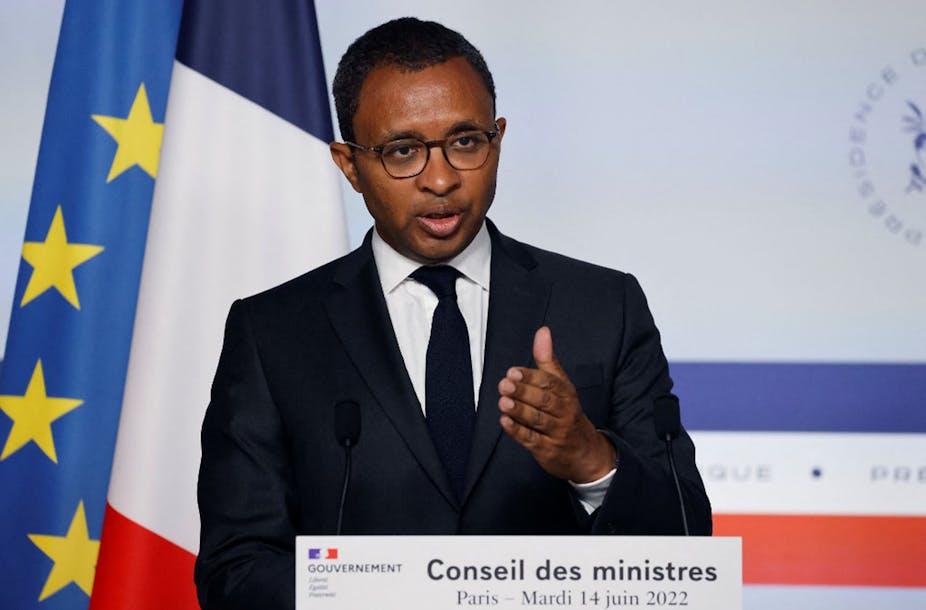After French president Emmanual Macron won reelection on 24 April, one of his surprise appointments to the new government was historian Pap Ndiaye as minister of education. The choice of a relative newcomer to politics, who presents himself as both a “symbol of diversity” and “a pure product of republican meritocracy,” came at a time when issues in race, gender, and identity politics have divided the French political class and public opinion.
Born to a French mother and a Senegalese father, Ndiaye is an internationally recognised academic specialising in US history and the history of minorities. A professor at the prestigious Sciences Po university and author of noted essays on African diasporas in the United States and France, he is considered a pioneer of “Black Studies à la française”, a field of studies whose goals and challenges he introduced in La Condition noire (The Black Condition, 2008).
In March 2021, Ndiaye was appointed director of the Palais de la Porte Dorée, France’s national immigration museum. He defined a clear mission statement for an institution housed in a building originally designed in the 1930s to promote the French colonial empire: “Our role is to make immigration a more essential part of the vision that the French have of their national history.”
A nod to Macron’s left
Given that Ndiaye’s nomination came in advance of what promised to be difficult parliamentary elections, it was perceived as an attempt to court progressive electorate whose support Macron and his party needed in the June 2022 parliamentary election to win a majority. While the French president ultimately lost that bet – and his parliamentary majority – the nomination also reflects a clear effort to move beyond the “culture wars” that have consumed both the United States and France in recent months.
In France, recent examples include a January colloquium that brought together academics, journalists, and public intellectuals to address the challenges allegedly posed by “ideologies largely imported from the United States”, including “decolonial thought, woke and cancel culture”. Another is the debate in the French Senate on 1 February 2022, when spokespeople for the conservative Les Républicains party sparred with senators from politically progressive and centrist parties over whether and how the “theories of wokeism threaten universities, higher education, and academic freedoms”.
Political and public debates on the influence of US-style wokisme in France have been fuelled by essays and publications such as Caroline Fourest’s Génération offensée (2020), Brice Couturier’s OK Millennials (2021), and Rachel Khan’s Racée (2021). The controversy underscores ideological, sociological and generational divergences in France – some advocate a multicultural model, while others prioritise France’s “universal” values. The country’s Fifth Constitution, enacted in 1958, defines France as:
“an indivisible, secular, democratic, and social Republic [that] shall ensure the equality of all citizens before the law, without distinction of origin, race or religion”.
In view of societal divisions today, Pap Ndiaye’s publications and interviews suggest he is as much a bridge between conflicting political leanings and divergent generational points of view as he is a mediator between American and French sensibilities.
Although he has explained that he supports many causes labelled as “woke”, including antiracism, feminism, and climate action, he made it clear that he does “not approve of moralising and sectarian discourse”. While he decries occurrences of racism and police violence in France, he characterises the expressions white privilege and state racism as excessively divisive.
Looking toward the US model
In La Condition noire, Ndiaye has advocated revising France’s current “colour-blind” policies on minority integration by carefully collecting ethnic and racial statistics. While this is standard practice in the United States, such data gathering is specifically prohibited in France. With this recommendation, Ndiaye opposes those who have rejected North American and, more generally, “Anglo-Saxon” practices on account of their perceived irrelevance to France’s history and context of racism.
This reference to the US model – as well as Ndiaye’s broader openness to ideas and policies originating in the country where he studied and taught as a Fulbright scholar – does not prevent him from defending traditional French values. An academic who has portrayed himself as “a product of the schools of the French Republic and of American affirmative action”, he prefers being described as an intellectuel engagé (“politically active intellectual”) rather than an “activist”. Here he implicitly links himself to the French intellectual tradition embodied by figures such as Émile Zola, Jean-Paul Sartre, Albert Camus and Simone de Beauvoir, all of whom underlined the importance of public intellectual discourse.
While acutely aware of the very different histories of France and the United States, Ndiaye highlights the common challenges experienced by minorities in both countries. Bridging French and American visions of society, he favours a form of “universalism that takes differences into account”.
In the immediate future, Emmanuel Macron will be well occupied trying to build a parliamentary coalition that will allow his party to govern. For France’s new education minister, his priorities will include “cooling off hot button and politically charged issues”. His mission as head of a department where past ministers have stayed for two years on average – his predecessor, Jean-Michel Blanquer, being a rare exception to this rule – is daunting.
In addition to overseeing a staff of 1.2 million teachers and administrators, and managing a budget equal to 6.6% of the French GDP, it entails such challenges as educational equity, addressing teachers’ overall low wages, and a growing crisis in the recruitment of competent educators.

